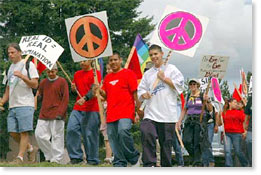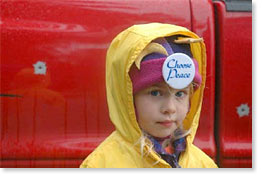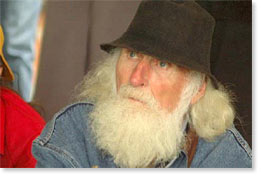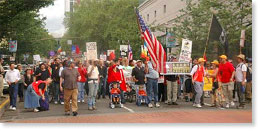|
||||||||||||||||
|
We didn’t stop the war in Iraq, our schools are still bleeding to death under the malign neglect of our politicians, hunger is endemic in Oregon, and George Bush is still President ... and in spite of all that the Rural Organizing Project Walk for Truth, Justice, and Community, co-sponsored by PCUN and Oregon Action, was a great success. To break the post 9/11 inertia (born of fear, disappointment, and unexpressed grief), more than 300 people (pregnant woman, women and men pushing children in strollers, teenagers, and the rest of us, including our elders in their ’70s and ’80s) took to the streets for a week from June 12th to June 18th, 2005. We walked from, Salem to Portland, an average of 10 miles a day, with stops in Brooks, Woodburn, Canby, and Oregon City. Each night we set up our tent city, and every morning packed it up and sent it on ahead to meet us at our next camping site. More than 300 walkers from 30 of the state’s 36 counties took part in the Walk. We were walking for the rights of children, the rights of immigrant workers, the rights of the poor, and in the fervent hope of ending the war in Iraq. We were taking our message to fund human needs, not war, to the streets of Salem and Portland, to the Governor’s office, the steps of Associated Oregon Industries, and to Senator Smith’s office in downtown Portland. Along the way, in Salem and Portland, we brought attention to the impact of the war on Oregon’s families and our economy. As we walked to Woodburn, we protested the attacks on immigrant workers and their families, and that night we celebrated with them at PCUN, the farmworkers’ union hall. During our stay in Canby we held a public forum on the impact of current policies and funding priorities as they affect small town Oregonians, and a press conference on the disastrous effect of Bush’s plan to privatize Social Security on rural Oregonians. In Oregon City, the day before our triumphal entry into Portland, the Walk focused on the attacks on civil rights and civil unions. On Friday more than 150 marchers swooped down off the Hawthorne Bridge and into the World Trade Center where Senator Smith has his offices. We were met by several hundred other activists who were there to cheer us on to the symbolic finish line. Songs were sung, chants were chanted and a representative of Gordon Smith was presented with hundreds of postcards calling on Senator Smith to speak out against the war and support the funding of desperately needed human services. Cara, from ROP, held a giant replica of the postcard and led the crowd in a spirited call and response version of the text. Then children from the walk began appearing from every corner of the crowd carrying handfuls of postcards. Senator Smith’s representative seemed to be sweating heavily … . The walk from downtown to St. Andrew Catholic Church, our final destination, was ecstatic. With a permit for the march/walk, the police blocked the streets for and we surged onto Broadway in high spirits. A few blocks later the No War Drum Corps (three snare drums and four bass drums) exploded into the street to lead the march. In the canyon of the city, seven drums and 500 marchers can make a lot of joyful noise. In Oregon City Suzanne Pharr, a longtime friend of ROP and one of the architects of the Walk, talked about the history of the struggle between those trying to limit freedom and the definition of full citizenship and those who have resisted those attempts. She helped us see that our Walk was part of a long history of resistance. Suzanne used the image of the canary in the coalmine. You can tell by the condition of the canary whether there is poison in the air. Suzanne identified three canaries that she watches to test the healthiness of our society: immigrants, the gay, lesbian, bi, and trans (LGBT) community, and prisoners. (I would add youth to the list, and I’m sure Suzanne would agree.) Looking at what is happening to these groups is a way to see what our future holds unless we do something to bring fresh air into the mine. And that is why we were on the road. We were walking for the canaries struggling to survive as their rights are stripped away. We were a source of fresh air. I’m not sure we saved in canaries along the way, but I do know that three days after we packed the Governor’s office with 150 marchers and three spokespeople from Military Families Speak Out and asked the Governor to redouble his efforts to bring the Oregon National Guard home, he made his most impassioned speech on the subject. I also know that those of us who walked were inspired by the stories we heard along the way and by each other, and that a real network of rural activists, not just an e-mail list, grew out of our days together on the road. If we tell our stories to ten of our friends, 3000 people in small towns around the state would see through our eyes that there are, all around us, those who hunger for justice and dignity in their lives, and that they are our sisters and brothers, not statistics. And as we told our stories they would know that we carried more than water, raingear, moleskin, and sunscreen in our daypacks. We also carried our vision of a better world -- a world at peace, a world of justice. A world we made by walking. The Rural Organizing Project is a coalition of 60 human rights organizations in rural areas around Oregon. For more information log on to ROP.org. For information about PCUN, log on to pcun.org. Published in In Motion Magazine, August 7, 2005 Also by Jerry Atkin:
|
||||||||||||||||
If you have any thoughts on this or would like to contribute to an ongoing discussion in the  What is New? || Affirmative Action || Art Changes || Autonomy: Chiapas - California || Community Images || Education Rights || E-mail, Opinions and Discussion || En español || Essays from Ireland || Global Eyes || Healthcare || Human Rights/Civil Rights || Piri Thomas || Photo of the Week || QA: Interviews || Region || Rural America || Search || Donate || To be notified of new articles || Survey || In Motion Magazine's Store || In Motion Magazine Staff || In Unity Book of Photos || Links Around The World || OneWorld / US || NPC Productions Copyright © 1995-2009 NPC Productions as a compilation. All Rights Reserved. |
||||||||||||||||






